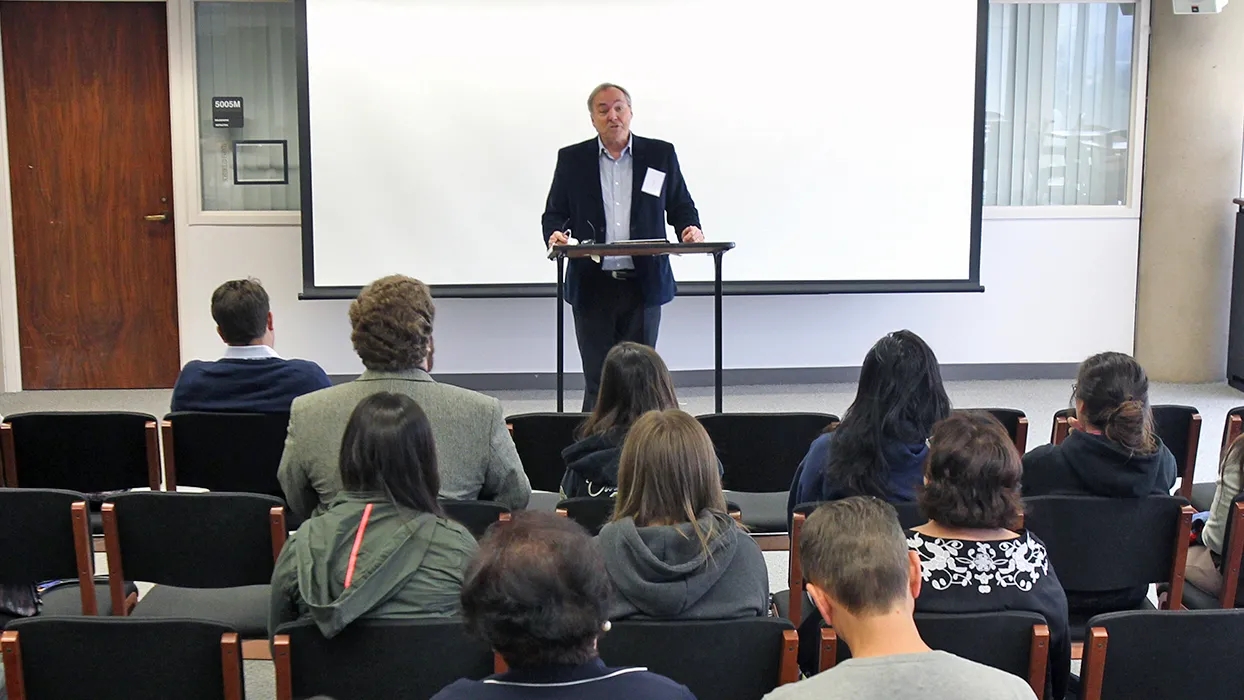Joe Gutierrez Office of Strategic Communication (909) 537-5007 joeg@csusb.edu

The 12th annual Latin American Studies Conference: Study of the Americas at CSUSB explored a variety of issues ranging from democracy, immigration, culture to identity concerning Latinos and indigenous peoples in the U.S. Photo: Peter Acosta/CSUSB
Gerardo Munck, professor of international relations and political science at the University of Southern California, presents at the 12th annual Latin American Studies Conference: Study of the Americas at CSUSB.
The 12th annual Latin American Studies Conference: Study of the Americas at Cal State San Bernardino explored a variety of issues ranging from democracy, immigration, culture to identity concerning Latinos and indigenous peoples in the United States. The two-day event, which took place on April 19-20, had the theme “Democracy in the Americas and Immigration.”
“Many thanks for making this year's Latin American Studies Conference a great success!” said Carmen Jany, professor of Spanish and linguistics, and coordinator of the Latin American Studies Program. “We had three wonderful and inspiring keynote speeches, CSUSB graduate students from four different departments and alumni from two different departments share their research, and great student and faculty attendance on Thursday and especially on Friday morning.”
The event, which is intended to foster interest, knowledge and understanding of the very diverse cultures of Latin America, featured three keynote speakers: Gerardo Munck, professor of international relations and political science at the University of Southern California; Kent Wong, director of the UCLA Labor Center and professor of Asian studies at UCLA; and Shannon Speed, director of the American Indian Studies Center and associate professor of gender studies and anthropology at UCLA.
Munck, Argentinian by birth, presented “Latin America’s Post-transitional Politics: Problems of and for Democracy in the New Century.” Munck received his doctorate in political science from UC San Diego and is a specialist on political regimes and democracy, methodology, and Latin America. His books include “Regimes and Democracy in Latin America,” “Passion, Craft, and Method in Comparative Politics” (with Richard Snyder), and “Authoritarianism and Democratization: Soldiers and Workers in Argentina, 1976-83.” He collaborated in the preparation of United Nations Development Programme’s report Democracy in Latin America in 2004 and is currently active in various initiatives to promote and monitor democracy.
Wong, who presented “U.S. Immigrant Youth at a Crossroads,” has published more than 10 books on the labor movement, immigrant rights, popular education and the Asian American community. His most recent books are “Nonviolence and Social Movements: The Teachings of Rev. James L. Lawson Jr.” and “Dreams Deported: Immigrant Youth and Families Resist Deportation.” Wong previously worked as staff attorney for the Service Employees International Union in Los Angeles, and was also the founding president of the United Association for Labor Education, a national organization representing university-based labor centers and union education departments. He is currently a vice president of the California Federation of Teachers, representing 120,000 teachers and educational workers, co-chair of the California Assembly Speaker’s Commission on Labor Education, and chair of the board of the New World Foundation.
Speed presented “Captive Stories: Indigenous Women Migrants and the Settler Capitalist State.” Speed is a citizen of the Chickasaw Nation and holds a doctorate in anthropology and Native American studies from UC Davis. She has worked for the last two decades in Mexico and in the U.S. on issues of indigenous autonomy, sovereignty, gender, human rights, violence, migration and social justice. She has published five books and edited volumes, including “Rights in Rebellion: Human Rights and Indigenous Struggle in Chiapas.” She has published numerous journal articles and book chapters in English and Spanish, as well as two books in Spanish. Her forthcoming book is called “Captive Stories: Indigenous Women Migrants and the Settler Capitalist State.” She is the recipient of various awards and honors, including a Radcliffe Institute for Advanced Study Seminar Grant, Harvard University; a Lifetime Achievement Award from the State Bar of Texas American Indian Law Section (2014); and the Dynamic Woman of the Year Award from the Chickasaw Nation of Oklahoma (2013).
The event also featured talks and presentations from CSUSB students, alumni and members from local universities in the region. Attendees also had the opportunity to watch a performance by Acto Latino, a CSUSB theater group that fosters the interest in Hispanic/Latino language, culture and literature through the presentation of Spanish-language plays.
“My warmest gratitude also to the Latin American Studies student club (ALAS) and to all of our student volunteers who ensured that everything was going smoothly,” said Jany, “in particular to Janet Valdez, the club president who has helped to put on this event for the fourth time!”
The Latin American Studies Conference was sponsored by the Association of Latin American Studies; the Center for International Studies and Programs; the College of Arts and Letters; the Department of World Languages and Literatures; the John M. Pfau Library; and the University Diversity Committee.